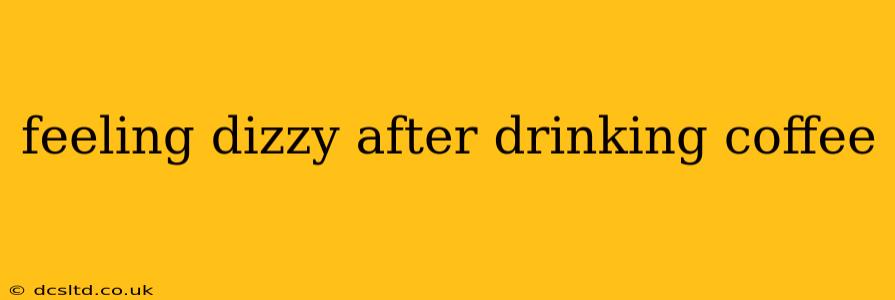Many of us rely on coffee to jumpstart our mornings or power through afternoons. But sometimes, that beloved cup of joe leaves us feeling anything but energized. Feeling dizzy after drinking coffee is a surprisingly common experience, and it's crucial to understand why this happens. This comprehensive guide explores the potential causes, offers practical prevention strategies, and advises on when to seek professional medical attention.
Why Does Coffee Make Me Dizzy?
The dizzying sensation after coffee consumption isn't always straightforward. Several factors can contribute, and it's often a combination rather than a single cause. Let's delve into the most common culprits:
1. Caffeine Sensitivity:
This is perhaps the most frequent reason. Caffeine is a stimulant that affects the central nervous system. Some individuals are more sensitive to caffeine than others. Even a small amount can trigger a rapid increase in heart rate and blood pressure, leading to feelings of lightheadedness, dizziness, and even anxiety. This sensitivity can be influenced by genetics, medications, and even current health conditions.
2. Dehydration:
Caffeine acts as a diuretic, meaning it increases urine production. If you're not adequately hydrated before consuming coffee, the diuretic effect can lead to dehydration, which, in turn, can cause dizziness, headaches, and fatigue. The drop in blood volume contributes to reduced blood flow to the brain, resulting in lightheadedness.
3. Low Blood Sugar:
While coffee might provide a temporary energy boost, it doesn't offer sustained energy. If you consume coffee on an empty stomach, your blood sugar levels might drop precipitously, leading to dizziness and shakiness. This is particularly true for individuals with conditions like hypoglycemia.
4. Anxiety and Panic Attacks:
Caffeine can exacerbate anxiety symptoms in susceptible individuals. The increased heart rate and heightened alertness can trigger or worsen anxiety attacks, resulting in feelings of dizziness, shortness of breath, and chest pain.
5. Medication Interactions:
Certain medications can interact negatively with caffeine, increasing the risk of dizziness and other side effects. It's essential to review your medications with your doctor or pharmacist to determine potential interactions. Some medications that might interact negatively include certain antidepressants, anti-anxiety medications, and blood pressure medications.
6. Underlying Medical Conditions:
In some cases, dizziness after coffee could indicate an underlying medical condition, such as an irregular heartbeat (arrhythmia), heart disease, or orthostatic hypotension (a sudden drop in blood pressure upon standing). It's crucial to consult a doctor if you experience frequent or severe dizziness, especially if accompanied by other symptoms like chest pain or shortness of breath.
How Can I Prevent Dizziness After Drinking Coffee?
Here are several strategies to mitigate the risk of dizziness after enjoying your coffee:
1. Moderate Your Caffeine Intake:
Start with smaller amounts of coffee and gradually increase your intake if tolerated. Listen to your body and pay attention to how it reacts. Everyone's caffeine tolerance is different.
2. Stay Hydrated:
Drink plenty of water throughout the day, especially before and after consuming coffee. This helps prevent dehydration and its associated symptoms.
3. Don't Drink Coffee on an Empty Stomach:
Have a small, healthy snack or meal before enjoying your coffee to prevent blood sugar crashes.
4. Choose Decaf or Low-Caffeine Options:
If you suspect caffeine sensitivity, consider switching to decaf coffee or opting for lower-caffeine alternatives like tea.
5. Manage Stress and Anxiety:
Practice stress-reducing techniques like deep breathing exercises, yoga, or meditation to mitigate anxiety and its potential interaction with caffeine.
6. Review Your Medications:
Consult your doctor or pharmacist about potential interactions between your medications and caffeine.
When Should I See a Doctor About Dizziness After Coffee?
While occasional dizziness after coffee is relatively common and often manageable, you should consult a doctor if:
- You experience frequent or severe dizziness.
- Dizziness is accompanied by other symptoms like chest pain, shortness of breath, or palpitations.
- You have a known heart condition or other underlying medical conditions.
- Dizziness significantly impacts your daily life or activities.
Your doctor can conduct a thorough examination to determine the underlying cause of your dizziness and recommend appropriate treatment or management strategies. Ignoring persistent dizziness could be detrimental to your health. It’s always better to err on the side of caution and seek professional medical advice when necessary.
What if I have other symptoms along with dizziness after drinking coffee?
This depends entirely on the accompanying symptoms. Chest pain, shortness of breath, or palpitations warrant immediate medical attention. Headaches could be related to dehydration or caffeine sensitivity, but persistent or severe headaches also require professional assessment. If you experience nausea or vomiting in conjunction with dizziness, it's crucial to seek medical advice.
Can I still drink coffee if I'm prone to dizziness?
Yes, but moderation and awareness are key. Listen to your body and adjust your coffee consumption accordingly. Experiment with smaller portions, lower-caffeine options, and always pair your coffee with adequate hydration and a light snack.
This information is for general knowledge and does not constitute medical advice. Always consult with a healthcare professional for any health concerns or before making any decisions related to your health or treatment.
